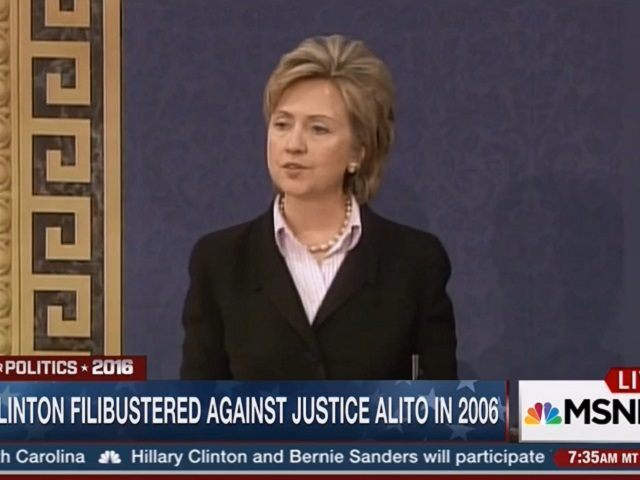On Tuesday’s “Place for Politics,” MSNBC host and political correspondent Steve Kornacki reacted to Democratic presidential candidate former Secretary of State Hillary Clinton’s denunciations of vows to block President Obama’s replacement for Supreme Court Justice Antonin Scalia by pointing out that both Hillary and President Obama tried to filibuster Samuel Alito’s nomination to the Supreme Court back in 2006.
After reading from Hillary’s tweet spree, where she said, “So, a message for Senate Republicans: Fill this vacancy. @POTUS will do his job. Do yours.” Kornacki stated, “Now, it’s worth noting, ten years ago, back in 2006, then-Senator Clinton joined with 24 other Democrats, including then-Senator Barack Obama, to filibuster — to try to filibuster the nomination of Samuel Alito, President George W. Bush’s nominee to the Supreme Court.”
Kornacki then played a clip of Hillary speaking against Alito’s nomination back in 2006. He added, “[T]he Republican posture we’re seeing right now is new in its own way, but it also didn’t come out of nowhere. It really seems like we’ve reached a point where after a generation of each party kind of moving the — what’s acceptable, sort of the norms on these things, we’ve now reached this point. It feels more like a culmination than something happening out of the blue.”
NBC News Justice Correspondent Pete Williams then said that “[H]istorical analogies kind of break down here, because if you look back far enough, it turns out to be more often that the Senate did not confirm the nomination of a president in his last year in office. In recent times, it’s a mixed record, but i don’t think any of that really matters, because of the confluence of events right now. A much more partisan Congress, and there are lots of factors that go into that, including battles over previous Supreme Court justices, but also the fact that this could tip the balance of the Supreme Court from more or less conservative to more or less liberal, and that’s really — that’s the most important fact here. So the president has to make a choice about whether he’ll nominate somebody he thinks is a consensus nominee, that could force or persuade some Republicans to vote for the nominee. We understand the white house has been reaching out to senate republicans saying, you know, ‘What would it take?’ there are nominees that would be acceptable to some republicans, but that’s the — that’s really what’s at stake here, much more so than any historical analogy that we can draw.
Kornacki then added, “[I]t feels like each side in this picks its own favorite historical analogy and says, ‘See, that’s the precedent. That’s how this supposed to work.’ And you can do it from either side.”
(h/t National Review)
Follow Ian Hanchett on Twitter @IanHanchett

COMMENTS
Please let us know if you're having issues with commenting.